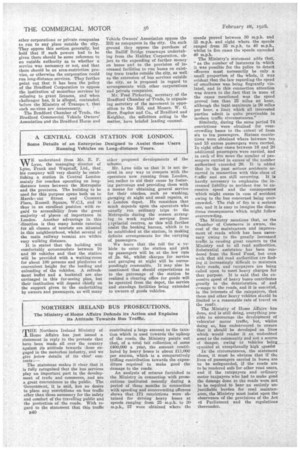NORTHERN IRELAND BUS PROSECUTIONS.
Page 66

If you've noticed an error in this article please click here to report it so we can fix it.
The Ministry of Home Affairs Defends its Action and Explains its Attitude Towards Bus Traffic.
THE Northern Ireland Ministry of Home Affairs has just issued a statement in reply to the protests that have been made all over the country against its attitude towards those engaged in the motorbus industry, and we give below details of its chile contents;—
The statement makes it clear that it is fully recognized that the bus services play an important part in the development of trade and commerce, and are a great convenience to the public. The Government, it is said, has no desire to place any restrictions on bus traffic other than those necessary for the safety and comfort of the travelling public and the protection of the roads. With regard to the statement that this traffic B40 contributed a large amount to the taxation which is used towards the upkeep of the roads, the Ministry points out that, of a total tax collection of some £400,000 a year, the amount contributed by heavy buses is about £11,000 per annum, which is a comparatively trifling contribution towards the expenditure required to make good the damage to the roads.
An analysis of returns furnished to the Ministry in connection with prosecutions instituted recently during a period of three months in connection with speeding and overcrowding offences shows that 171 convictions were obtained for driving heavy buses at speeds ranging from 25 m.p.h. to 30 m.p.h., 57 were obtained where the
speeds proved between 30 m.p.h. and 35 m.p.h. and eight where the speeds ranged from 35 m.p.h. to 40 m.p.h., whilst in five eases the speeds exceeded 40 m.p.h.
The Ministry's statement adds that, "as the number of instances in which it was possible for the police to detect offences must necessarily be only a small proportion of the -whole, it was evident that the law regarding the speed of omnibuses was being flagrantly violated, and in this connection attention was drawn to the fact that in none of the cases mentioned was the speed proved less than 25 miles an hour, although the legal maximum is 20 miles per hour, a limit which all interested parties admit is quite practicable in modern traffic circumstances."
Similarly, during the same period 74 convictions were obtained for overcrowding buses to the extent of from six to ten passengers. Sixteen convictions were obtained where between ten and 15 excess passengers were carried. In eight other cases between 16 and 20 additional passengers were carried, and in each of five more the number of passengers carried in excess of the number authorized exceeded 20. It is added that in the past serious accidents occurred in connection with this class of affic and are still occurring. It is hardly necessary to emphasize the increased liability to accident due to excessive speed and the consequences which might ensue in case of accident owing to the bus concerned being overcrowded. The risk of fire is a serious one, and it is easy to imagine the disastrous consequences which might follow overcrowding,
• The Ministry mentions that, as the Chamber of Commerce is aware, the cost of the maintenance and improvement of roads which has been necessary owing to the greatly increased traffic is causing great concern to the Ministry and to all road authorities. Substantial assistance has been rendered from the Road Fund, but even with that aid road authorities ore finding it increasingly difficult to maintain their roads, and ratepayers are being called upon to meet heavy charges for that purpose. It is said that the excessive speed of heavy buses contributes greatly to the deterioration of and oemage to the roads, and it is essential, in the interests of the ratepayers, that these and other heavy vehicles should be limited to a reasonable rate of travel on the roads.
The Ministry of Home Affairs has done, and is still doing, everything possible to encourage the development of vehicular motor traffic, but, whilst doing so, has endeavoured to ensure that it should be developed on lines which would render it an undoubted asset to the community and not a source of danger, owing to vehicles being ejsrated at exceptionally high speeds, In the circumstances, the statement closes, it must be obvious that if the lives of passengers carried in buses are to be safeguarded, if the roads are to be rendered safe for other road users, and if the ratepayers and ordinary motor taxpayers who had to make good the damage done to the roads were not to be required to bear an entirely unjustifiable burden for road maintenance, the Ministry must insist upon the observance of the provisions of the Act of Parliament and the regulations thereunder.




















































































































